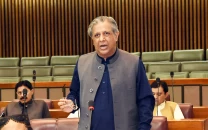Finance ministry says 60% of economy out of tax net

Finance ministry says 60% of economy out of tax net
“Sixty percent of our economy is a no-go area for taxes. Transport, agriculture, wholesale, retail and key services have to be taxed,” said Saqib Sherani, Principal Economic Adviser to the Ministry of Finance.
In a meeting of a subcommittee of the National Assembly’s Standing Committee on Finance and Revenue, Sherani sought the parliamentarian’s support to bring the no-go areas into the tax net from the next financial year. He said that the agriculture sector’s contribution to the gross domestic product was 20.9 percent but its share in total taxes was only 1.2 percent.
The services sector contributed more than half to the GDP but its share in taxes was around 25 percent. Sherani said that this year again the tax-to-GDP ratio would remain unchanged, which was the lowest in South Asia.
According to reports, the tax-to-GDP ratio of Pakistan is 9.3 percent. Additional Secretary Expenditure Seerut Fazal requested the committee to devise a mechanism so that more sectors could be brought into the tax net. Convener of the sub-committee Abdul Rashid Godil recommended that every income above a set threshold should be taxed including agriculture. Shahid Khaqan Abbasi of PML-N said “the tax culture encourages people to cheat and not to pay taxes.” FBR’s Trade and Tariff chief Ashraf Khan briefed the committee about broader parameters of the new tax measures.
He said that the Federal Board of Revenue was considering whether 35 to 50 percent regulatory duty on import of luxury items should continue in the next fiscal policy or not.
He said the FBR was also considering giving relief to the manufacturing industry and small-scale importers. Karachi Chamber of Commerce and Industry’s Taxation Committee Chairman Qamar Suleman presented budget proposals to the NA panel. He demanded a reduction in the corporate tax and turnover tax rates.
Suleman warned that if the government tried to enforce value-added tax from the next financial year, Karachi traders would protest and come on streets.



















COMMENTS
Comments are moderated and generally will be posted if they are on-topic and not abusive.
For more information, please see our Comments FAQ